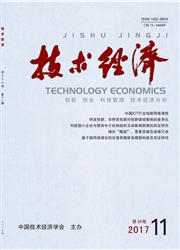

 中文摘要:
中文摘要:
构建了一个扩展的南北贸易模型,讨论了南方知识产权保护的决定因素及其对南北双方福利的影响。在模型中,南方政府内生决定知识产权保护水平,北方厂商内生决定研发投资水平和市场竞争策略,南方厂商内生决定自主创新或模仿。研究发现:南方的最优知识产权保护水平与北方存在差异;当南方厂商模仿北方厂商的技术时,南方执行最严格的知识产权保护对北方福利和南方福利都造成损害;当南方厂商的创新效率较高时,严格的知识产权保护能激励南方厂商进行自主创新、改善南方福利。
 英文摘要:
英文摘要:
This paper develops an extended North-South trade model to investigate the factors affecting southern intellectual property right(IPR)protection,and analyzes the effects of IPR on the welfare of North and South.In this model,the Southern government determines the level of IPR protection endogenously,and the Northern firm decides its RD investment level and market competition strategy endogenously,and the Southern firm chooses between indigenous innovation and imitation endogenously.It is found as follows:the optimal level of IPR protection of South is different from that of North.;the strictest IPR protection of South reduces the welfare of both regions when the Southern firm imitates;stronger IPR protection encourages indigenous innovation of Southern firm and increases the Southern welfare when the Southern firm's innovation is efficient.
 同期刊论文项目
同期刊论文项目
 同项目期刊论文
同项目期刊论文
 期刊信息
期刊信息
